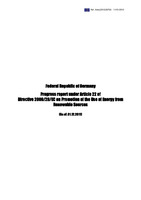Federal Republic of Germany Progress report under Article 22 of Directive 2009/28/EC on Promotion of the Use of Energy from Renewable Sources

working document
Συγγραφέας
EU Commission
Ημερομηνία
2012-01-11Προβολή/
Θεματικές επικεφαλίδες
Renewable sources ; Energy PolicyΠερίληψη
Germany is on the cusp of a sea change in its energy supply. The Fukushima disaster on 11 March 2011 prompted the Federal Government to adopt key new features for a fast-tracked transition in energy policy on 6 June 2011. Alongside the decision to phase out nuclear power completely by the end of 2022, these key features flesh out and fast-track a raft of measures that had already been adopted in September 2010 under the Federal Government’s Energy Concept. Germany will completely phase out power generation from nuclear energy in a gradual fashion by the end of 2022 at the latest. The eight nuclear power plants that were shut down in Spring 2011 will not be reconnected to the grid. Renewable energies will play a decisive role in Germany’s future energy supply. Renewable energies shall account for 60% of total consumption in 2050, and at least 80% in the electricity sector. The German Parliament adopted a comprehensive package of measures on 30 June 2011 on how to implement this transition in energy policy, including the amendment of the Renewable Energies Act (EEG). This has paved the way towards entering the renewable energy age. The more rapid phasing-out of nuclear power means that the reorganisation of the energy supply that began with the Energy Concept needs to be implemented faster. Nevertheless, climate protection remains a key driver alongside security of supply and cost effectiveness. This transition in energy policy needs to be socially and environmentally responsible and ecologically sound. The decision to implement this energy transition provides major signals for investment in innovation and technological progress
Αριθμός σελίδων
73p.Γλώσσα
ΑγγλικάΣημείωση
http://aei.pitt.edu/id/eprint/88707Ref. Ares(2012)29766
